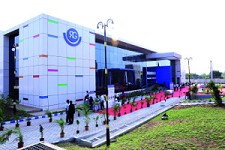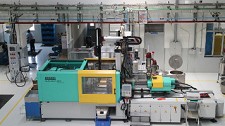New India Fastener Plant Qualifies for LEED Certification

FEATURE
![]()
From a cooling system chosen to save 80% on energy to strategic use of glass to reduce lighting costs, the new ARaymond plant in India has caught the attention of customers, India’s manufacturing industry and people in the Pune region.
ARaymond spent around 8% of its budget for a new fastener plant in India on reducing environmental impact. The new plant has qualified for LEED certification.
The new ARaymond plant in Chakan, in Western India, supplies a range of fasteners to automotive and industrial companies across the country. The plant has become one of the most environmentally sustainable facilities in India.
From the design stage, the focus was on the five elements of soil, energy, water, air and materials.
The plant opened in October 2013, and will receive the LEED New Construction Gold certification this year, making it one of few manufacturing facilities in India to receive the certification. LEED (Leadership in Energy & Environmental Design) is an internationally recognized rating system for the design, construction, operation and maintenance of green buildings, homes and neighborhoods.
ARaymond’s plant is designed to reduce both carbon footprint and energy consumption.
• ARaymond installed an evaporative cooling system that consumes 80% less energy per year than a standard air conditioning system.
• Savings include 160.1 MWh per year because artificial light is not used during the day due to strategic use of glass, and 400 MWh per year is saved through energy efficient LED street lighting and T5 compact fluorescent lamp (CFL)-based internal lighting luminaire, as well as automatic motion sensors.
• Water usage is 77% lower than conventional buildings due to low-flow plumbing fixtures, a dual flush system and water recycling. An aquifer recharge system uses 300 cubic meters per day of rain water – equivalent to the daily water requirement of 500 households – collected from the roof and recharged into the ground water system.
• Prior to construction, ARaymond removed 2,500 cubic meters of fertile black cotton top soil to be conserved and utilized for landscaping elsewhere.
• Trees planted close to the facility balance industrial emissions. The plantations are estimated to absorb nearly 4,200 kg CO2 – equivalent to the amount produced by a car driving 40,000 km) per year of the total emissions generated by the factory.
• Materials used for both the building envelope and the internal elements of the building contain 19% recycled content.
“This plant reflects our key values – respect for the environment, people, and local laws,” India managing director Manish Padharia explained. “A sustainable approach is very important for our clients – each and every customer talks a lot about this. We are also ensuring that the facility provides a comfortable and enjoyable working experience for all our staff.”
ARaymond manufactures plastic fasteners at the plant to supply India’s automotive and industrial markets. Next year ARaymond in India plans to expand into fasteners for the renewable energies industry plus add metal fastener production.
Rayce, ARaymond’s R&D service, will open a facility at the Chakan plant this year.
Today the plant employs 107 people and that is expected to increase to 250 by 2016.
Founded in 1865 by Albert-Pierre Raymond in France the company initially made fastening elements for gloves and footwear. ARaymond moved into automotive fasteners in 1936 with clips for car trim panels; started plastic injection in 1955; clips and clamps for shipyards and construction in 1970; plastic connectors for automotive fuel systems in 1991; and expanded into industrial equipment, building, energy and agriculture markets in 2008.
In 2009 ARaymond acquired the U.S.-based metal fasteners specialist, Tinnerman. ARaymond established itself in India in 2007. Web: ARaymond.com





There are no comments at the moment, do you want to add one?
Write a comment